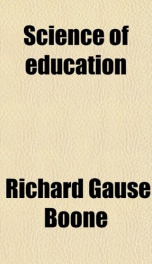science of education

Purchase of this book includes free trial access to www.million-books.com where you can read more than a million books for free. This is an OCR edition with typos. Excerpt from book: of the highly developed trades have evolved a body of technical knowledge, are reflective, and rest upon well- established principles; or that, in the pulpit, there may be found very effective preaching accompanied with a meagre theology; or a successful practice of law with little acquaintance in equity. It only means that in our highly industrial age the occupations of man are in flux, and, with increasing knowledge and the aggressions of science, there goes on, on the one hand, a professionalizing of trades, and on the other, an adjustment of the profession to life. Once the distinction would have held with little exception; it is still approximately true, and is here so used. Further, to be distinctly professional, this knowledge must have been logically related in a system. Speaking narrowly, the past has given us systems of theology, of medicine, and of law, with their respective arts preaching, therapy, and pleading. The first and second have developed several systems, each with its organized body of technical knowledge, its adherents forming a school, and the practice conforming to its accepted theory. The exclusiveness of its art was proportioned to its special and peculiar teachings. Its teachings were organically related, and were prohibitive of many forms of practice entirely legitimate by other schools. The technical knowledge had an integral meaning, and stood for a certain order of procedure. In theology, with its conclusions as to the nature of the soul, the future life, sin, right living, repentance, redemption, etc.; in medicine, involving particular theories held asto disease and health, the functioning of organs, the nature and action of medicines, and conditions of healing ; and in law, standing for a fairly uniform meaning given to social rights and oblig...
Info about the book
Author:
Series:
Unknown
ISBN:
0136117570
Rating:
4/5 (10)Your rating:
0/5
Languge:
English
Users who have this book
Users who want this book
What readers are saying
What do you think? Write your own comment on this book!
write a commentif you like science of education try:
Do you want to exchange books? It’s EASY!
Get registered and find other users who want to give their favourite books to good hands!


